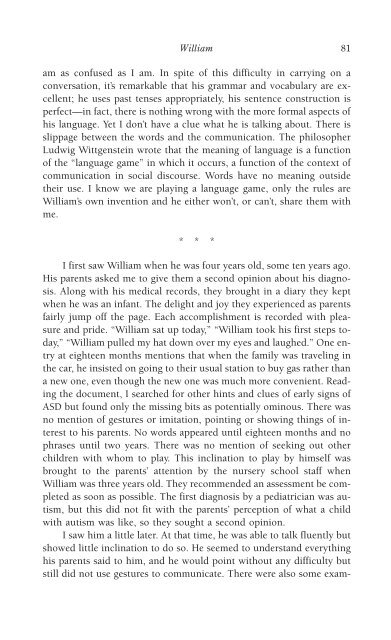978-1572305441
autism
autism
Create successful ePaper yourself
Turn your PDF publications into a flip-book with our unique Google optimized e-Paper software.
William 81<br />
am as confused as I am. In spite of this difficulty in carrying on a<br />
conversation, it’s remarkable that his grammar and vocabulary are excellent;<br />
he uses past tenses appropriately, his sentence construction is<br />
perfect—in fact, there is nothing wrong with the more formal aspects of<br />
his language. Yet I don’t have a clue what he is talking about. There is<br />
slippage between the words and the communication. The philosopher<br />
Ludwig Wittgenstein wrote that the meaning of language is a function<br />
of the “language game” in which it occurs, a function of the context of<br />
communication in social discourse. Words have no meaning outside<br />
their use. I know we are playing a language game, only the rules are<br />
William’s own invention and he either won’t, or can’t, share them with<br />
me.<br />
* * *<br />
I first saw William when he was four years old, some ten years ago.<br />
His parents asked me to give them a second opinion about his diagnosis.<br />
Along with his medical records, they brought in a diary they kept<br />
when he was an infant. The delight and joy they experienced as parents<br />
fairly jump off the page. Each accomplishment is recorded with pleasure<br />
and pride. “William sat up today,” “William took his first steps today,”<br />
“William pulled my hat down over my eyes and laughed.” One entry<br />
at eighteen months mentions that when the family was traveling in<br />
the car, he insisted on going to their usual station to buy gas rather than<br />
a new one, even though the new one was much more convenient. Reading<br />
the document, I searched for other hints and clues of early signs of<br />
ASD but found only the missing bits as potentially ominous. There was<br />
no mention of gestures or imitation, pointing or showing things of interest<br />
to his parents. No words appeared until eighteen months and no<br />
phrases until two years. There was no mention of seeking out other<br />
children with whom to play. This inclination to play by himself was<br />
brought to the parents’ attention by the nursery school staff when<br />
William was three years old. They recommended an assessment be completed<br />
as soon as possible. The first diagnosis by a pediatrician was autism,<br />
but this did not fit with the parents’ perception of what a child<br />
with autism was like, so they sought a second opinion.<br />
I saw him a little later. At that time, he was able to talk fluently but<br />
showed little inclination to do so. He seemed to understand everything<br />
his parents said to him, and he would point without any difficulty but<br />
still did not use gestures to communicate. There were also some exam-



